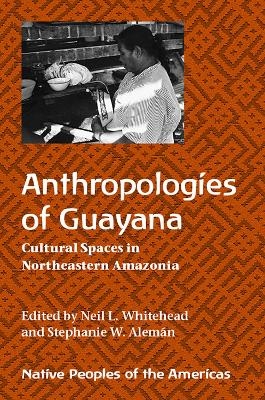
Anthropologies of Guayana
Cultural Spaces in Northeastern Amazonia
Seiten
2016
University of Arizona Press (Verlag)
978-0-8165-3361-9 (ISBN)
University of Arizona Press (Verlag)
978-0-8165-3361-9 (ISBN)
- Titel z.Zt. nicht lieferbar
- Versandkostenfrei
- Auch auf Rechnung
- Artikel merken
Brings together the work of scholars from North America, South America, and Europe to reveal the anthropological significance of Guayana, the ancient realm of El Dorado and still the scene of gold and diamond mining. The volume focuses on the historical ecology of the rain forest and the archaeological record up to the sixteenth century, as well as ethnography, ethnology, and perceptions of space.
Unlike better-known regions of the Amazon, Guayana-a broad cultural region that includes the countries of Guyana, Surinam, and French Guiana, as well as parts of eastern Venezuela and northern Brazil-has rarely been integrated into the broader narratives of South American anthropology and history. Nevertheless, Guayana provides a unique historical context for the persistence and survival of native peoples distinct from the histories reflected by the intense colonial competition in the region over the past five hundred years.
This is an important collection that brings together the work of scholars from North America, South America, and Europe to reveal the anthropological significance of Guayana, the ancient realm of El Dorado and still the scene of gold and diamond mining. Beginning with the earliest civilizations of the region, the chapters focus on the historical ecology of the rain forest and the archaeological record up to the sixteenth century, as well as ethnography, ethnology, and perceptions of space. Contributions analyse the emergence of a postcolonial national society, the contrasts between the coastlands and upland regions, and the significance of race and violence in contemporary politics.
Unlike better-known regions of the Amazon, Guayana-a broad cultural region that includes the countries of Guyana, Surinam, and French Guiana, as well as parts of eastern Venezuela and northern Brazil-has rarely been integrated into the broader narratives of South American anthropology and history. Nevertheless, Guayana provides a unique historical context for the persistence and survival of native peoples distinct from the histories reflected by the intense colonial competition in the region over the past five hundred years.
This is an important collection that brings together the work of scholars from North America, South America, and Europe to reveal the anthropological significance of Guayana, the ancient realm of El Dorado and still the scene of gold and diamond mining. Beginning with the earliest civilizations of the region, the chapters focus on the historical ecology of the rain forest and the archaeological record up to the sixteenth century, as well as ethnography, ethnology, and perceptions of space. Contributions analyse the emergence of a postcolonial national society, the contrasts between the coastlands and upland regions, and the significance of race and violence in contemporary politics.
Neil L. Whitehead is a professor of anthropology at the University of Wisconsin-Madison. He is the author of Dark Shamans: Kanaim and the Poetics of Violent Death. Stephanie W. Alem n is an assistant professor of anthropology at the University of Wisconsin-Stevens Point.
| Erscheinungsdatum | 25.05.2016 |
|---|---|
| Zusatzinfo | 16 halftones |
| Verlagsort | Tucson |
| Sprache | englisch |
| Maße | 152 x 229 mm |
| Gewicht | 458 g |
| Themenwelt | Geisteswissenschaften ► Archäologie |
| Sozialwissenschaften ► Ethnologie ► Völkerkunde (Naturvölker) | |
| Sozialwissenschaften ► Soziologie | |
| ISBN-10 | 0-8165-3361-X / 081653361X |
| ISBN-13 | 978-0-8165-3361-9 / 9780816533619 |
| Zustand | Neuware |
| Informationen gemäß Produktsicherheitsverordnung (GPSR) | |
| Haben Sie eine Frage zum Produkt? |
Mehr entdecken
aus dem Bereich
aus dem Bereich
Schweden : Ambiguitäten verhandeln - Tolerieren als soziale und …
Buch | Softcover (2023)
Brill Schöningh (Verlag)
CHF 69,85
Buch | Softcover (2023)
transcript (Verlag)
CHF 75,60
eine postkoloniale Ethnografie journalistischer Praxis in Jordanien
Buch | Softcover (2023)
transcript (Verlag)
CHF 68,60


